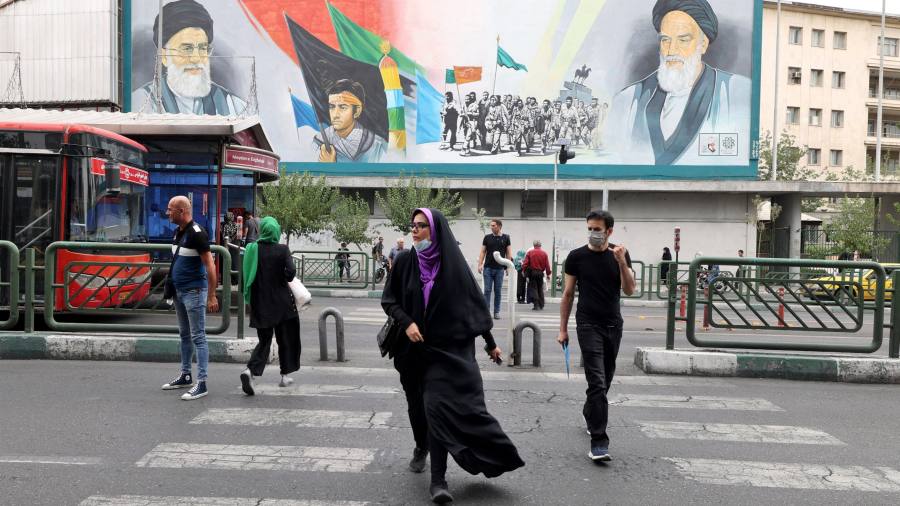US and European powers have resumed discussions on how to engage with Iran over its nuclear activity as fears mount that the Islamic republic’s aggressive expansion of its programme risks triggering a regional war.
The move marks a shift in western thinking and underscores concerns about an escalating crisis, as Tehran has enriched uranium to such levels that US officials have warned in recent months that it could produce sufficient material for a nuclear weapon in less than two weeks.
“There is recognition that we need an active diplomatic plan to tackle Iran’s nuclear programme, rather than allowing it to drift,” said a western diplomat. “The thing that worries me is that Iran’s decision-making is quite chaotic and it could stumble its way into war with Israel.”
The US, France, Germany and the UK halted diplomatic efforts to resolve the crisis in September after Tehran angered western governments by rejecting a draft proposal to revive the 2015 nuclear accord, launched a violent crackdown on anti-regime protesters, sold armed drones to Russia and detained a number of European nationals.
But there has been contact with Iranian officials in recent months, including a meeting in Oslo in March between officials from the so-called E3 — France, Germany and the UK — and Ali Bagheri Kani, Iran’s nuclear negotiator.
Rob Malley, the US’s Iran envoy, has met several times with Iran’s UN ambassador Amir Saeid Iravani, who was a senior official at the Supreme National Security Council before being posted to New York in September, diplomats and analysts say.
Those talks are thought to be the first direct contact between US and Iranian officials since former US president Donald Trump triggered the crisis in 2018 by withdrawing from the nuclear accord Tehran signed with world powers, known by its acronym JCPOA. Trump imposed hundreds of sanctions on the republic, while Iran responded by aggressively increasing its nuclear activity.
The talks focused primarily on the possibility of a prisoner exchange with Iran, a person close to the administration said. Tehran holds at least three US-Iranian nationals.
Tehran last week agreed to a prisoner exchange with Belgium and separately released two Austrians held in Iran. A successful US prisoner exchange could improve the environment for any nuclear talks.
US President Joe Biden pledged to return to the JCPOA and ease sanctions if Tehran returned to compliance with the accord. But more recently US officials have said the accord “is not on the agenda”, indicating any agreement would be more limited.
Diplomats and analysts say potential options include some form of interim deal, or a de-escalatory move by both sides under which Iran reduces its enrichment levels in return for some sanctions relief.
“The prisoner swap is going to be an opener for the talks,” said another diplomat briefed on the talks. “It is unlikely there will be a nuclear deal, but there could be some sort of interim thing, or a freeze.”
One US official said Washington “always believed diplomacy is the best way to verifiably and durably ensure Iran never acquires a nuclear weapon”, adding: “But we have nothing to announce, and we have not removed any option from the table.”
Iran has been enriching uranium to 60 per cent purity, and in January the International Atomic Energy Agency discovered particles enriched to about 84 per cent, which is almost weapons grade, at the Fordow plant.
In the weeks since, Israel’s officials have warned the Jewish state would do whatever it needs to prevent Iran developing a nuclear weapon.
News agencies quoted leaked IAEA reports this week saying the UN watchdog no longer had questions on the particles found at Fordow. That could ease pressure on Iran ahead of a IAEA board of governors meeting next week.
Sanam Vakil, an Iran expert at Chatham House, said: “There are attempts at reinvigorating thinking on the crisis, and it’s highly urgent because Iran is a nuclear threshold state. “Everyone is just looking for a Band-Aid.”
However, there is scepticism about Iran’s seriousness in addressing the nuclear issue and whether Biden would be willing to negotiate a deal as the US prepares for its next election cycle.
Ali Vaez, an Iran expert at Crisis Group, said: “The E3 is mostly looking to Washington to see if the Biden administration makes a decision, but they are frustrated because the US just wants to put a lid on this until after the 2024 elections. The primary concern here is the president’s re-election.”
Read the full article here




